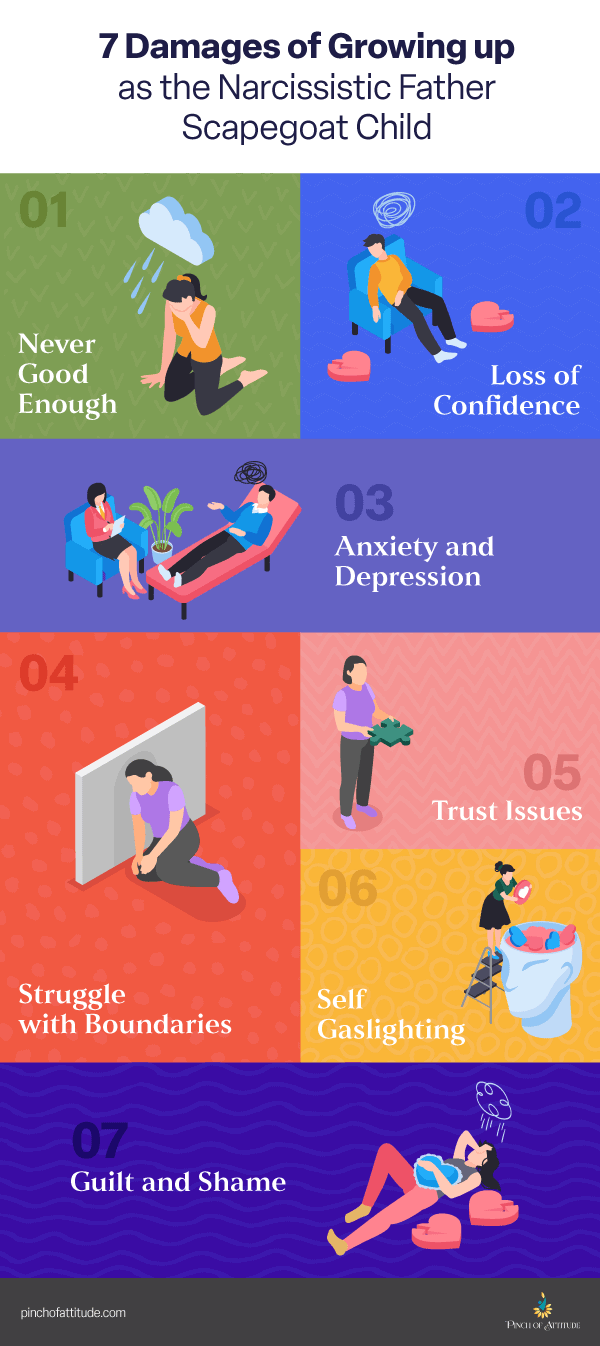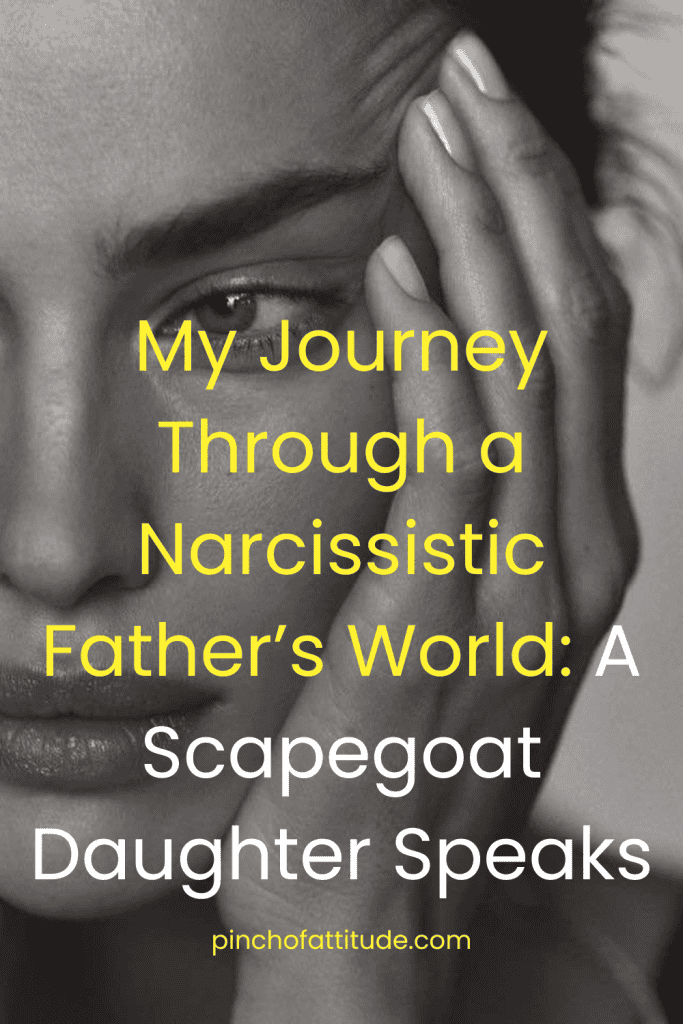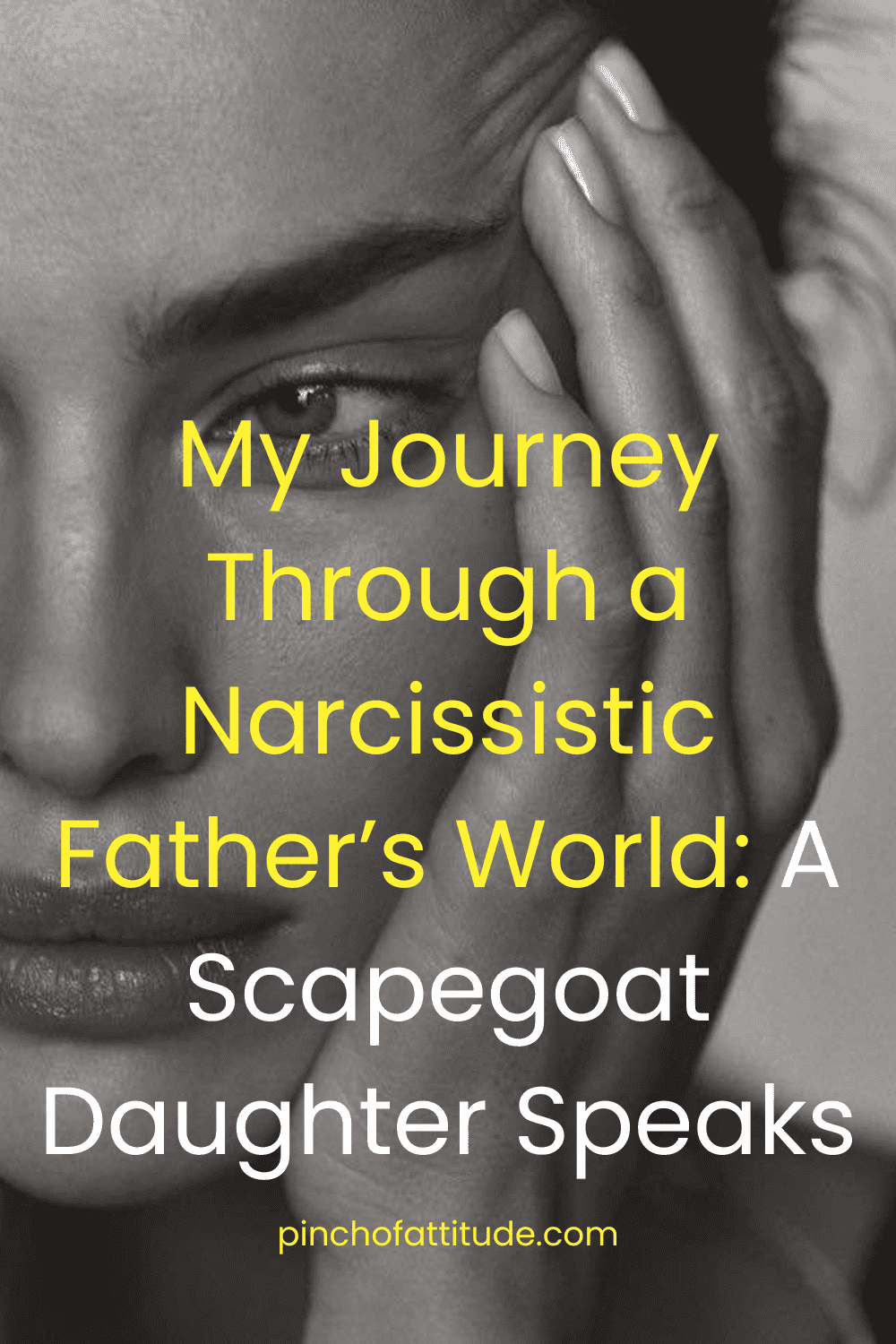Were you chosen as the “problematic child” of your family? Do all family issues magically end up being your fault?
Growing up as a scapegoat daughter of a narcissistic father probably turned your brain into a tangled mess of “Why me?” and “What did I do?”
Yep, I’ve been there. Raised by a narcissistic mother myself, I know the messy and emotional rollercoaster ride of being a part of such toxic family dynamics.
Below, I’ll share the scars and lessons that shaped my survival in hopes of helping you escape the emotional black hole that is your dad.
- You were never the problem, it was your dad’s manipulation playing tricks in your mind. Reclaim your true self, not the scapegoat he painted.
- As the scapegoat child in a family of narcissists, boundaries, and self-care are your armor. Protect your well-being and prioritize activities that nourish your soul.
- Healing is possible, even if it takes time. Seek support, explore healthy outlets, and believe in your resilience.
Table of Contents
What Is a Scapegoat Daughter of a Narcissistic Father?

A scapegoat daughter of a narcissistic father is a child chosen by the family to absorb blame, criticism, and negativity within the family toxic dynamic. Often contrasted with a golden child sibling, this daughter becomes the designated problem child, assigned to carry the weight of the toxic family dynamic on her shoulders.
This scapegoat role, solidified early in childhood, shapes a unique emotional landscape:
- Constant criticism: Living under her narcissist father’s judging eyes, she might feel that every action is wrong and every mistake is magnified. In turn, this breeds self-doubt and feelings of inadequacy.
- Emotional neglect: Her emotional needs go unmet, and are instead replaced by cold indifference or explosive anger. Feeling unloved and unseen further buries her in deep loneliness and isolation.
- Blamed for everything: From family tensions to societal woes, the scapegoat daughter bears the brunt of blame. Over time, the child becomes resentful of her father.
- Strangled identity: These child roles force the scapegoat to suppress her own needs and desires to appease the narc father. So, in adulthood, she becomes confused and uncertain about her true identity.
Rooted in childhood trauma, these lived experiences leave lasting scars on your emotional well-being as your father’s scapegoat.
Tip
Acknowledging and understanding what really happened is the first step to healing. Your family may deny or minimize the abuse, but don’t let their gaslighting dim your truth.
Why Does a Narcissistic Father Need a Scapegoat Daughter?
A narcissistic father needs a family scapegoat daughter for two reasons: control and self-protection. Just like someone with narcissistic traits needs a golden child to reflect their inflated sense of self, they also need a villain to project their flaws, insecurities, and blame onto.
Imagine the family unit as a fragile ecosystem.
The narcissist demands absolute control and manipulates the dynamics to maintain their position. Children in narcissistic families often fall into pre-determined roles.
The narc parent’s scapegoat child will become the emotional lightning rod, absorbing the negativity he can’t (or won’t) accept in himself.
Since the scapegoat consistently receives blame and criticism, she becomes an embodiment of everything the narcissist despises in themselves.
Basically, the role of the scapegoat allows the narcissistic dad to deflect attention away from his own flaws and maintain his positive self-image.
At the same time, it also bolsters his ego. How so?
The scapegoat’s perceived negativity becomes a stark contrast to his self-proclaimed perfection.
This reinforces his inflated sense of superiority and provides him with a narcissistic supply, of the admiration and validation he craves.
Think your father fits this description? If so, you will probably relate even more to the damages endured by scapegoat daughters.
7 Damages of Growing Up as the Narcissistic Father Scapegoat Child

The roles in the narcissistic family system can mess you up in ways you wouldn’t even believe. But hey, we wouldn’t be scapegoat survivors if we couldn’t talk about the scars, right?
If you’re ready to dig into the possible impact your dad had on you, here is the not-so-glamorous reality of what happens to a narcissistic father’s scapegoat daughter:
1. You End Up Feeling Like You’re Never Good Enough, No Matter What You Do
Ever spend your life running a marathon towards that finish line of “good enough,” only to find the damn thing keeps moving?
No matter how many As you bring home, how many extracurriculars you conquer, the goalposts for his approval just… shift.
The worst part? The more a child is made to believe she’s not good enough, the more the damage inflicted by a narcissistic dad takes root.
So, you’re left wondering, “Am I actually worthy of anything at all?” This self-doubt is the worst lie a narcissistic dad plants in your mind.
But here’s the secret: it’s not you, it’s him. His need to tear you down is his twisted way of building himself up.
Because without you as his scapegoat, he loses the canvas on which to paint his own distorted version of superiority.
2. You’re Constantly Made to Feel Less Than, So Your Confidence Takes a Hit
You know that feeling when you walk into a room and suddenly feel like you’ve shrunk two inches? That’s the daily reality of being the scapegoat child of a narcissist.
It’s like you are constantly wearing an invisibility cloak, except instead of being invisible, everyone just points out how much less sparkly you are than the “golden child sibling.”
Every achievement gets minimized, every opinion gets dismissed, and your self-esteem gets chipped away like a bad paint job.
And when you’ve been the scapegoat in the family long enough, you start to believe the lies, too. That you’re less interesting, less capable, less worthy.
But that voice in your head telling you you’re not enough? It’s not yours, it’s your dad’s.
Tip
Challenge negative thoughts with evidence of your strengths and achievements. Keep a list of your successes and positive qualities to remind yourself of your worth.
3. You Carry Around a Load of Guilt and Shame That’s Hard to Shake Off
Many scapegoat daughters carry heavy emotional baggage thanks to the messed-up dynamics in a narcissistic family.
Whether it’s a covert narcissist dad who masters the art of guilt-tripping, or a more overt type who throws blame like confetti, their negativity sticks to you like glitter.
These feelings of guilt have nothing to do with reality. Yet, shaking them off can feel like trying to outrun a sloth in molasses.
The scapegoat may replay every argument, second-guess every decision, and wonder if maybe, just maybe, they are the problem.
It’s time to unpack that baggage, examine each brick for what it truly is (manipulation, gaslighting, emotional abuse), and gently set it down.
You deserve to walk free, guilt-free, and rediscover the joy of feeling light as a feather, not weighed down by someone else’s drama.
4. You Develop Anxiety and Depression
Growing up, were you constantly blamed, criticized, and made to feel like the black sheep?
Perhaps your nervous system is on high alert all the time. Every raised voice, every harsh word, sends your heart racing and your stomach churning.
When your own home, the place you should feel most secure, is a breeding ground for negativity, the entire world feels unsafe and unpredictable.
It’s no wonder scapegoated children develop anxiety and depression.
The emotional abuse the scapegoat child experiences feeds their anxiety and depression. But although it might feel overwhelming right now, there is hope.
With therapy, support, and self-compassion, you can heal and develop healthy coping mechanisms.
5. Trusting Others Becomes a Real Struggle for You
One of the effects of growing up with a narcissistic dad is that it becomes tough to trust anyone, even the good guys.
Imagine it like this: a child learns to expect the rug to be pulled out from under them at any moment. So they build walls to protect themselves.
Sadly, those walls can keep out the good stuff too. Trust, vulnerability, genuine connections – they all get locked out with the negativity.
Sure, it’s okay to build walls around your heart until it feels safe to open the door again.
But you have to remember that not everyone is out to get you, and some people deserve your trust. Start small, take baby steps. You’ll get there.
Tip
Your struggles are real, but they don’t have to define you. With time, self-compassion, and maybe a little therapy, you can learn to trust again.
6. Setting Boundaries Feels Like an Uphill Battle
Trying to set boundaries as the scapegoat of a narcissistic parent is no easy feat.
Expect every step to be met with resistance, guilt trips, and maybe even a sprinkle of emotional manipulation.
You see, your abusive parent may have trained you to be the family doormat, always available to absorb his negativity and clean up his mess.
This setup’s impact on the scapegoat child can be huge.
You might struggle to even identify your own needs and wants, let alone communicate them to someone who seems allergic to boundaries.
This is why saying “no” feels like defying the natural order.
It won’t be easy. There will be pushback, tantrums, and maybe even tears (yours or theirs). But with each “no,” you’re reclaiming your power, inch by inch.
7. You Gaslight Yourself
Do you also hear that sneaky little voice that whispers doubts, twists memories, and makes you question your own sanity?
That’s the after-effect of your narcissistic parent’s gaslighting.
It’s like they infected you with a self-doubt virus, and now you’re stuck replaying their manipulation in your own head.
Maybe you saw your dad throw a tantrum, but the voice whispers, “He was just stressed.”
Or when you remember a hurtful comment, but it insists, “I’m probably misremembering.”
Basically, your internal compass becomes all wonky, and it’s now hard for you to trust your own perception and emotions.
How I Survived Being the Scapegoat Daughter of a Narcissistic Parent

Growing up, I was also a scapegoat child of a narcissistic parent. So, I know the drill.
The never-ending criticism, the unfair comparisons, the feeling like you’re walking on eggshells all day. My narcissistic mother made sure I experienced all that and more.
But guess what? I made it out, scars and all, and I’m here to share the battle plan that got me through.
Here’s what I did:
I Set and Maintained Firm Boundaries to Protect My Well-Being
Setting and maintaining boundaries with your narcissistic parent is not like putting up a picket fence around the house. It’s more like building a freaking fortress on Everest.
It takes guts, strategy, and a whole lot of self-compassion.
You see, for me, I realized that distance from the narcissistic abuser, even from the rest of the family sometimes, was crucial for my well-being.
I didn’t completely cut ties with the family, but I started saying “no” more often and stopped being afraid to take breaks when the negativity became too much.
Some folks judged called me cold, and maybe even selfish.
But you know what? They weren’t the ones picking up the emotional shrapnel after a narcissistic explosion.
My boundaries weren’t meant to punish anyone. They were a life raft thrown to me, a way to stay afloat in a sea of chaos.
I Prioritized Self-Care and Made It a Non-Negotiable
Growing up in a narcissistic household was like being stuck on a carnival tilt-a-whirl in permanent “insane” mode.
You were constantly trying to hold on, but the world kept spinning, your stomach churning, and your head threatening to explode.
So, how did I survive, you ask? I made self-care my DIY emotional armor!
It wasn’t just about bubble baths and face masks (although those were welcome respites!), it was about finding the things that soothed my soul.
At 13, I stumbled upon meditation – yeah, picture me, a pre-teen channeling my inner yogi amidst the teenage drama. But hey, it worked!
Those five minutes with my eyes closed, focusing on my breath, were like tiny vacations from inner turmoil.
The point is that self-care doesn’t have to be extravagant or expensive. Find those simple things that fill your cup, that remind you you’re worth the investment.
Maybe it’s taking a nature walk, reading a good book, having a laugh with a supportive friend, or simply curling up with a cup of your favorite tea.
Tip
Listen to your body, your mind, your soul. They will whisper the things you need, and it’s your job to honor them.
I Sought Therapy From a Professional
I already mentioned boundaries and self-care, but therapy was the cherry on top. It was what helped me heal the wounds and deal with my mental health issues.
Finding a therapist who gets it isn’t always easy.
I kissed a few frogs (metaphorically, thank goodness) before I connected with someone who understood the tangled mess of family dynamics, the mind games, the guilt trips, the whole shebang.
But when I did, it was like a lightbulb popped on in my brain. Suddenly, the patterns that used to baffle me became crystal clear.
I learned to untangle my emotions and understand my parents and siblings more, to recognize and challenge their manipulations, and most importantly, to prioritize my own mental health.
Therapy wasn’t always sunshine and rainbows, though. There were tears, moments of anger, and plenty of digging through some ugly memories.
But with each session, I felt stronger, clearer, and more in control of my own narrative.
I Learned to Identify Manipulative Tactics
Ah, yes, the art of spotting manipulation! Consider me a black belt in this particular sport, thanks to years of sparring with my mom.
See, adult children of narcissistic parents become pretty darn good at identifying those manipulative tactics. We can practically smell the gaslighting from a mile away.
It wasn’t always like this, though.
At first, I was putty in her hands, reacting like Pavlov’s dog to every veiled insult, every passive-aggressive jab.
But eventually, something clicked. I started noticing the patterns: the sudden emotional shifts, the backhanded compliments, the “just kidding” followed by a hurtful barb.
I realized that her negativity wasn’t a reflection of me, it was a reflection of her, a broken record stuck on “blame.”
Once I identified this trait, the power shifted.
I stopped being the audience in her emotional play, I became the director. I learned to detach, to let her words slide off like rain on Teflon.
I practiced responding calmly, setting boundaries, and not taking the bait.
It wasn’t easy, trust me. There were times I stumbled, times I let the negativity hook me, but each time, I got back up a little stronger, a little wiser.
I Developed Healthy Outlets Like Journaling or Sports
Let’s face it. Living with a narcissistic parent can leave you feeling like a pressure cooker about to explode.
Me? I used to struggle with anxiety, my mind a tangled mess of pent-up emotions.
But then I discovered the power of healthy outlets, and let me tell you, it’s like trading a rusty nail for a freaking Excalibur.
My first weapon of choice? Journaling.
It started as a way to vent, to scream on paper without waking the whole house. But soon, it became a space for self-discovery, a place to untangle the knots in my mind and make sense of the chaos.
I poured my frustrations, my fears, even my weird dreams onto those pages, and with each word, I felt a little lighter, a little freer.
Then came the sports. Yeah, picture me, a former queen of the couch potato kingdom, suddenly lacing up my sneakers.
It wasn’t about winning, it was about reclaiming my body, pushing my limits, and feeling the endorphins wash away the negativity.
Every run, every kick, every bead of sweat was a victory, a middle finger to the anxiety that used to control me.
Of course, your healthy outlets don’t have to be the same as mine. Maybe it’s painting, dancing, playing music, or even baking delicious stress-busting cookies.
Tip
Find what makes you feel alive, what makes you forget about the drama for a while, and do it. Do it often, and do it loud!
Related Posts:
- Narcissistic Father and Daughter: Signs, Traits and How to Cope
- When the Scapegoat Fights Back: I Wasn’t Born to be a Pushover!
- The Tragedy of a Narcissist Family Scapegoat: My Personal Experience and How I Overcame It
- How to Stop Being the Scapegoat: In Family, Relationships & Adulthood
- How to Heal After Being the Scapegoat of the Family? My Side of the Story
Frequently Asked Questions
How can the scapegoat daughter of a narcissistic father survive the abuse?
Recovery from narcissistic abuse involves setting boundaries, seeking therapy, building a support network, and prioritizing self-care. It’s a marathon, not a sprint, and you can survive.
How does a narcissistic father destroy his daughter?
Victims of narcissistic parenting experience emotional manipulation, gaslighting, and constant criticism that leave lasting scars. They struggle with shattered self-esteem and a distorted sense of self-worth.
What do narcissistic fathers do to their daughters?
Narc parents manipulate, criticize, and emotionally neglect their daughters. They often endure a cycle of control and validation seeking.
How do you prove a narcissistic father?
Proving a narcissistic father involves observing consistent traits linked to narcissistic personality disorder and narcissism, such as grandiosity, lack of empathy, and a pattern of exploiting others.
How does having a narcissistic father affect you as a daughter?
Many scapegoat children may grapple with chronic feelings of inadequacy and struggle to establish healthy relationships. These lead to damaged self-esteem, trust issues, and lifelong emotional scars.




